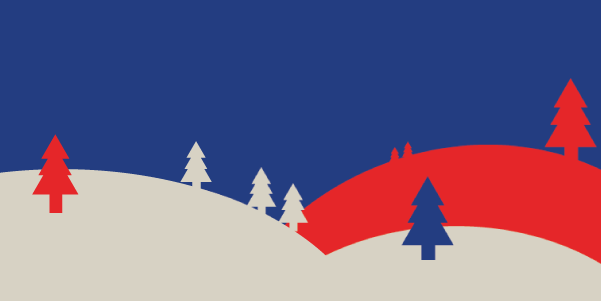Want Less Stress This Holiday Season?
Check out these sustainable ideas, options and videos
Holidays are a great time to gather with family and friends. And they can also create more work and stress than usual because our already long “to do” lists get much longer.
Here are some sustainable questions and answers, choices and videos to help you reduce your stress level and the stress on the environment during this holiday season.
Should I recycle wrapping paper?
None of the haulers in our region accept wrapping paper of any kind in the recycling bins. Wrapping paper is typically coated with foil, glitter, or other items. Put wrapping paper in the trash.
What are alternatives to wrapping paper?
Don’t contribute to the 4.6 million pounds of wrapping paper thrown out each year. Try these options instead.
- Fabric scraps
- Old newspapers
- Paper bags
- Pillowcases
- Reusable baskets
- Reusable, hand-decorated (or store-decorated) boxes
- Give presents the way Santa does — unwrapped, with a reusable bow!
I want to give gifts that are kinder to the environment. What are some good options?
- Give a practical, useful gift that saves energy or money or improves health and quality of life like a smart thermostat, air filter or EV charger. For more ideas, see the Energy Star Holiday Gift Guide.
- Give the gift of your time (offer to help family members or friends do something they can’t do by themselves).
- Give experiences (restaurant gift certificates, movie passes, cooking class, tickets to a live event, spa day, etc.).
- Give someone who doesn’t know much about the climate crisis a copy of “The Carbon Almanac: It’s Not Too Late.”
- Some families and friends agree not to exchange gifts during the holidays. Discuss this as a possible option for next year with the people in your circles. You might be surprised to learn that they would jump at the chance to eliminate the stress and expense of gift giving.
- Give gift cards to stores the recipient likes.
- Donate to the recipient’s favorite charity.
Shop Local
Some of my family members have strong opinions that are at odds with mine. How can I remain calm, cool and collected throughout the holiday season?
The world would be boring if we all thought exactly alike. So, rather than trying to get someone to adopt your worldview, instead, try to learn more about how that person came to have their opinion. Look for ideas (or embedded values) on which you do agree.
Below are two previous Sustainable U videos that offer suggestions for how to do this:
- “How To Talk to the Other Side” by author Kevin Wilhelm
- “Transform Conflict With Reflective Structured Dialogues” by Dr. Jill DeTemple
Another valuable is Dr. Katherine Hayhoe’s new book, “Saving Us: A Climate Scientist’s Case for Hope and Healing in a Divided World.”
In “Saving Us,” Hayhoe argues that we need to find shared values that will motivate us to collective action. We need to bond and connect with others who have differing opinions, and when appropriate, inspire them with innovative ideas. Facts are only one part of the equation (see chapters 20-22)
Dr. Jill DeTemple encourages us to use our superpower of curiosity to learn and connect with others.
Both videos and the book offer strategies that will work for all subjects, not just political or climate.
How does effective communication support sustainability? It is the cornerstone of Sustainable Development Goal No. 16 (Peace, Justice and Strong Institutions).
Without respectful, civil communication, the world will never be able to resolve its numerous challenges peacefully.
So, it is up to us all to be the change we wish to see in the world.
Happy holidays from Sustainable Dallas College!
Join the Spring DC Sustainability Book Club!
Sign up now for the Spring Book Club, hosted by Sustainable Dallas College.
We will read and discuss “The Carbon Almanac: It’s Not Too Late” by Seth Godin.
“The Carbon Almanac: It’s Not Too Late” is a book of climate change infographics and facts that was published this past summer. Seth Godin compiled it with more than 300 contributors from around the world. He calls it his most important project to date because of the urgent challenge to counter climate change. He hopes it will help to “coordinate the actions of a billion people, to inspire and connect and to rewire our economy” to slow climate change. Rich with essays, graphs, cartoons, tables and resources, the almanac provides credible and authoritative information on carbon and its impact on the climate that is easy to access and share, and that people like us can understand.
Seth Godin recently spoke at our 12th annual Sustainability Summit, where he discussed the inspiration behind “The Carbon Almanac: It’s Not Too Late,” and its significance.
Join this book club to learn the basics of climate change and how we all have an impact on the environment around us. Book club participants will meet every two weeks via Teams beginning in February 2023. (Links will be sent to your email.)
A copy of “The Carbon Almanac: It’s Not Too Late” will be provided to all participants free of charge as supplies allow.
Please contact Faye Bajo at FDavis@DallasCollege.edu to reserve your spot!
Follow Us on Social Media!
Follow Sustainable Dallas College on Facebook, Twitter and YouTube! Stay up to date on our upcoming sustainability events, and connect with other people passionate about creating a sustainable way of life.
